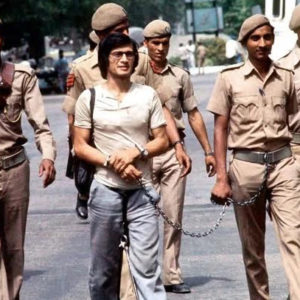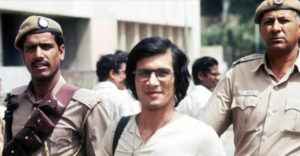 On September 13, 2003, Rajesh Gurung, a young photojournalist at ‘The Himalayan Times’, had received an assignment from his editorial team — to get a photograph of Charles Sobhraj. The serial killer had been spotted at Thamel [an area in Kathmandu popular among tourists] and the newspaper was keen to get pictorial evidence.
On September 13, 2003, Rajesh Gurung, a young photojournalist at ‘The Himalayan Times’, had received an assignment from his editorial team — to get a photograph of Charles Sobhraj. The serial killer had been spotted at Thamel [an area in Kathmandu popular among tourists] and the newspaper was keen to get pictorial evidence.
From September 14 to 16, Rajesh hung around Thamel, observing everyone closely. On the third day, his manhunt came to an end. He clicked several snaps of Charles Sobhraj, keeping his camera in stop-motion to capture every second of Charles’s exit from the communication centre in Thamel.
In September, a front-page news story appeared in ‘The Himalayan Times’. ‘Annapurna Post’, another newspaper from the same publishing house, also picked it up.
The man known the world over as ‘The Serpent’ has come calling to Kathmandu. Charles Sobhraj, the internationally well-known ex-criminal and now a free man, has been camping in Thamel for the last fortnight.
The ostensible reason for his visit is that he is attempting to forge ties with Nepalese entrepreneurs to export pashmina and possibly start a mineral water factory.
Three days later, on September 20, the two newspapers ran another story about Sobhraj. This time, it was not as positive about the man’s business plans.
The report was run under the headline ‘The Serpent is Finally Caught’ and it said:
“Ironic as it may seem, Charles Sobhraj Gurumukh, known worldwide as ‘The Serpent’, was arrested from a local casino late last night by a special team of the Kathmandu Police.
 “The team, headed by Deg Bahadur GC, the deputy superintendent of police at the Valley Crime Investigation Branch, zeroed in on Sobhraj after a painstaking search spread over three days. The manhunt began on Wednesday when ‘The Himalayan Times’ and ‘Annapurna Post’ broke the story about Sobhraj being in Kathmandu.
“The team, headed by Deg Bahadur GC, the deputy superintendent of police at the Valley Crime Investigation Branch, zeroed in on Sobhraj after a painstaking search spread over three days. The manhunt began on Wednesday when ‘The Himalayan Times’ and ‘Annapurna Post’ broke the story about Sobhraj being in Kathmandu.
“Following the report, the police began searching hotels in Thamel and the Naya Bazaar area. They learnt that Charles had rented a room in The Garden Hotel in Naya Bazaar, but eventually found the room to be empty. The police then began looking in the casinos. He was apprehended by the police when he was having dinner at the casino and thereafter taken to the Kathmandu District Police Office.
“The man who once pompously claimed that he could smuggle in an elephant through the customs check at the Tribhuvan International Airport is today cooling his heels in the regional police office, Bhrikutimandap.”
That day, the international media had been flooded with the breaking news. Speculation had been endless. After all, Charles Sobhraj had been arrested in Nepal from the Royal Casino, from the very heart of the capital city of Kathmandu.
What had he been doing there? Had he intentionally come back to Nepal to get arrested for murders committed 30 years ago? Or was the whole thing a mistake?
September 20, 2003. Early in the morning, Charles was taken to the immigration department with an initial charge of passport forgery.
The police prepared a case against him for entering Nepalese territory with two different passports — one Dutch and the other French. He appeared in public later that day, covering his face with a red handkerchief as the police dragged him to the Kathmandu District Court.
It was widely believed that the police were keeping him in custody for further investigations under the Immigration Act of Nepal.
But the truth was different. Mr Baral, the deputy inspector general who headed the Valley Police Office, divulged it to the media in a press conference.
He said the police department was not able to interrogate him properly because of a three-day national strike. The department was working on finalizing a chargesheet against him, a chargesheet much more serious than passport forgery.
“He is guilty of committing premeditated murders of two foreign nationals in Nepal,” said Mr Baral. “He cannot escape the law anymore.”
“Mr Charles Sobhraj, what do you have to say about your arrest?” Journalists fell over each other as they tried to get an interview with Charles, even as the police pushed him inside the van.
“This is my first visit to Nepal. I have not committed any murders in Nepal.” The police van sped out of the exit gate of the Kathmandu District Court, leaving his words and his conviction hanging in the air.
Later that day, the police remanded him, not entertaining any of his justifications or demands. For an entire month, they were busy preparing a chargesheet against him.
From time to time, the police happily shared some of their findings with the media — and the public. If they took delight in grilling him about the murders he had committed, they did not hide it. The police unearthed it all, one by one. (IANs)
(Excerpted from ‘Charles Sobhraj – Inside The Heart Of The Bikini Killer’ with the permission of the publisher, Rupa)



